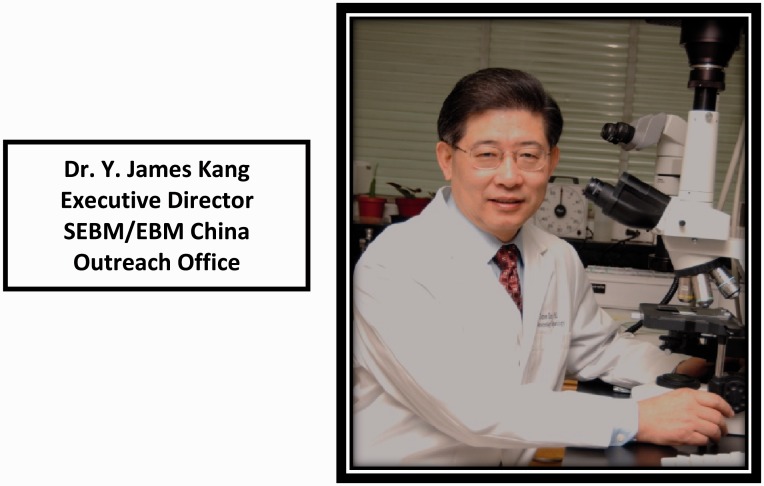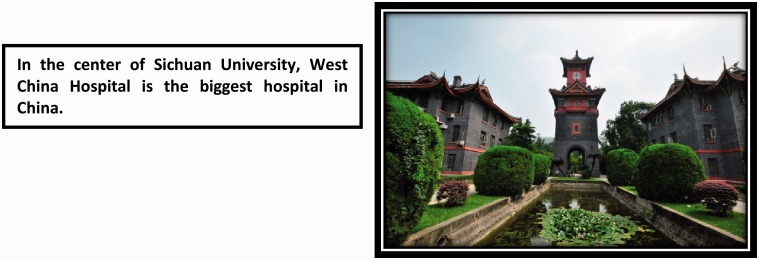At its December 10, 2014 Fall Meeting, the Society of Experimental Biology and Medicine (SEBM) Council voted to move the SEBM/Experimental Biology and Medicine (EBM) China Outreach Office (SECOO) to the Sichuan University, West China Center for Medical Sciences, in Chengdu. This change of venue began on January 1, 2015. Furthermore, the SEBM Council selected a long-term friend of the Society and EBM as the Executive Director: Y. James Kang, PhD.
Dr. Kang is currently China One-Thousand-Talents Professor and Director of Regenerative Medicine Research Center at Sichuan University West China Center of Medical Sciences. Dr. Kang was recruited among the first group of the China One-Thousand-Talents recruitment program in 2009. Prior to the current post, Dr. Kang was professor of Medicine, and Pharmacology and Toxicology at University of Louisville School of Medicine, and Distinguished University Scholar of the University of Louisville. He is currently the Editor-in-Chief of the journals Cardiovascular Toxicology and Regenerative Medicine Research, and the Editor of the book series of Methods in Pharmacology and Toxicology. His research interests are in regenerative medicine, focusing on 3D bio-printing and cardiovascular regeneration, as well as dietary manipulation of cardiovascular disease, liver fibrosis and cirrhosis, oxidative stress and antioxidant mechanisms, metallothionein and glutathione, and non-human primate models for human diseases.
Dr. Kang has been a major contributor to SEBM and EBM for more than 10 years. His service to the society and journal include: being a member of the EBM Editorial Board (2003–2005); serving as Associate Editor for the EBM Pharmacology and Toxicology category (2005–2010); being and elected SEBM Council member (2009–2013); and providing excellent contributions as Chair of the SEBM Publication Committee (2012–1013). In 2011 Dr. Kang received the honor of receiving a Distinguished Scientist Award from SEBM.
Sichuan University is one of the biggest federally-funded universities in China. It has 10,637 primary faculty members, more than 60,000 students, among which 21,000 are graduate students. West China Center of Medical Sciences is one of schools/colleges in Sichuan University.
West China School of Medicine/West China Hospital of Sichuan University (WCSM/WCH) is a prestigious medical center located on the banks of the Jinjiang River in Chengdu. After 120 years of development, WCSM/WCH has become a comprehensive medical teaching and research center with diverse disciplines, abundant faculty resources, advanced medical techniques, modern medical equipment, and strong potential in medical research. WCH is the largest single-site hospital in the world and a leading medical center of West China. WCSM has more than 814 professors and associate professors, 165 supervisors of Ph.D. students, and 325 supervisors in the Master's program. Current enrollment of students includes 45 postdoctoral researchers, 470 doctoral candidates, and more than 1000 master's candidates. The Regenerative Medicine Research Center, directed by Dr. Kang, is one of the most important centers in WCH for biomedical scientific research and technology innovation.
Chengdu, well known for its natural beauty and Panda bears, is located at the center of China. It is a thriving city with high end hotels and restaurants and many outstanding venues to hold our annual International Experimental Biology and Medicine Conference (IEBMC). The Chengdu airport has air services provided by United Airline, US Airways, Northwest, and American Airline including direct flights from the United States; which will make air travel convenient for SEBM members.
Speaking on behalf of SEBM and EBM, we are very excited about our new partnership with Sichuan University and working with Dr. Y. James Kang on raising the profile of SEBM and EBM in China.
Steven R. Goodman, PhD
Editor-in-Chief, Experimental Biology and Medicine




